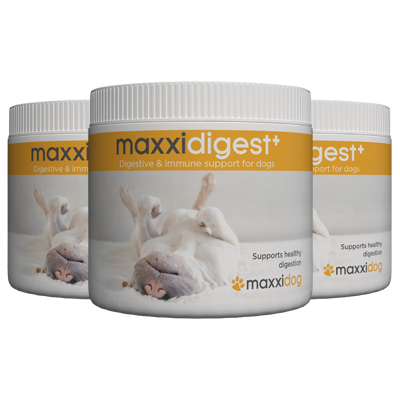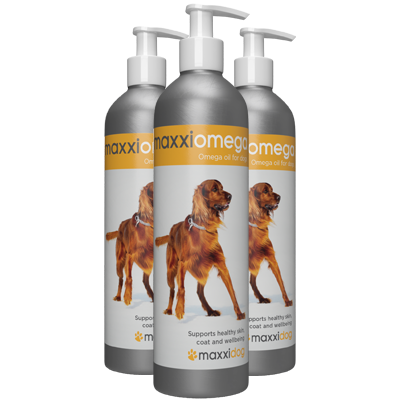Allergies in Dogs
Allergies in dogs are unfortunately quite common, and it affects the dog’s overall health. Dog allergies can be lifelong condition that may require ongoing therapy to control symptoms.

By Victoria Lister-Richards DVM
What Are the Different Types of Allergies in Dogs?
Atopic dermatitis (AD) is a well-recognised condition affecting a significant population of dogs in the UK; up to 10% dogs can be affected. Atopic dermatitis can develop at any age and is not breed specific, although it’s more common in young dogs and in certain breeds such as the West Highland White Terrier.
Dogs with AD tend to have very itchy skin; in the majority of cases the face, ears and feet are affected but the tummy and armpits can also be involved. Constant irritation can cause your dog to excessively scratch, lick and bite affected areas which makes their skin red, sore and open to infection.
Atopy is a type of environmental allergy, but your dog can have an environmental allergic reaction to any substance he encounters, such as grass, mold, pollen, and dust. Other common dog allergies include food allergies and flea allergies.
What Causes Atopic Dermatitis in Dogs?
Atopic dogs inherit a set of genes that results in excessive synthesis of a specific antibody (IgE) synthesis and those impairing the skins natural defensive barrier. IgE antibodies are absorbed through the surface of skin and are produced in response to certain environmental allergens.
Allergens that could trigger an abnormal reaction include, most commonly house dust mite allergens but also pollens from trees, weeds and grasses, human and animal danders, moulds, household products or to allergens from bacteria and yeast organisms.
When IgE antibodies bind to certain immune cells called mast cells in the skin epidermis, this triggers them to degranulate releasing certain factors, known as cytokines and histamine, which triggers inflammation and intense itching (pruritis).

How Is Atopic Dermatitis Diagnosed?
Food allergies and flea allergies cause almost identical symptoms to atopic dermatitis thus need to be ruled out before a diagnosis can be made by your veterinarian. Food allergies can be ruled out by implementing a strict 8-week diet trial using a novel protein diet (one that your dog has not yet been exposed to) or hydrolysed diet (protein broken down into smaller proteins that the body doesn’t recognise). Laboratory tests involving microscopic examination of skin scrapings can be used to help rule out skin parasites.
The diagnosis of AD can only be made if these conditions have been ruled out combined with consistent history and clinical signs.
How Is Atopic Dermatitis in Dogs Treated?
Unfortunately, once a diagnosis is made, AD is a lifelong condition and will require ongoing therapy to control symptoms. Treatment for AD often includes a specialist diet, medication to help break the itch-scratch cycle, immunotherapy, and skin supplements.
1. Reduction Of Pruritis (Itching) With Pharmacological Agents
There are a number of licensed veterinary products used for the treatment and long-term management of atopic dermatitis.
Glucocorticoids(prednisolone) are the probably the most commonly used drug to control the symptoms of AD in the immediate term. They can be very effective in most cases and are relatively cheap compared to other drugs. The only disadvantage is that they are associated with a number for side effects especially if used long term. Glucocorticoids may be indicated by your veterinarian to control future flare-ups or if your dog has a seasonal allergy lasting 3 months or less. This is often assessed on a case-by-case basis and you will need to consult with your veterinarian if this is to be incorporated into long term management of your dog’s AD.
Ciclosporin (Atopica, Novartis) is a licensed treatment for canine AD and can be effective in up to 80% cases. Ciclosporin is associated with fewer side effects than prednisolone, but the only disadvantage is cost. In some cases, it may be able to be given on alternate days or even twice weekly depending on response.
Oclacitinib (Apoquel, Zoetis) is another treatment available to treat AD. This can be very effective in controlling symptoms both in the short term as well as in the long term with few side effects. Oclacitinib works by suppressing the effects of proinflammatory cytokines or those that have a role in allergies.
Antihistamines are not as effective as other medications but may be useful as part of adjunctive therapy. They are not licensed for dogs but may be beneficial in some cases. The most commonly used in chlorphenamine (Piriton). If your dog is receiving antihistamines then you need to watch out for adverse effects such as drowsiness and discontinue treatment if this is the case.
Allergen-Specific Immunotherapy
Allergen testing can be conducted to test for specific antigens in the environment triggering the symptoms of AD. This commonly involves sending off a blood sample to an external laboratory to be analysed. Once the specific antigen has been identified then a unique vaccine containing the specific antigen can be given, this is known as immunotherapy. The benefits of immunotherapy can be seen in 50-75% cases however it can take up to 2-9 months before improvement is seen. Immunotherapy may be a consideration in patients with all year-round disease rather than seasonal allergies.
Because healthier gut means healthier dog
When the digestive tract becomes unbalanced, whether from stress, illness, improper diet, medication or surgery it can be a long path back to finding balance and proper function. With maxxidigest+, our advanced therapeutic formula supports recovery for both digestive health and immune support, so that your dog can be back to tip top shape quickly and easily.
Read more
Benefits
- Designed specifically for the unique digestive tracts of dogs
- Combines pre- and probiotics with antioxidants in one supplement
- Safe to give alongside other medications, including antibiotics
2. Improving Skin Epidermal Barrier Function
Specialist diets and dietary supplements. Controlled diet trials, as mentioned above, may be implicated to rule out food allergic dermatitis as part of the diagnostic work-up for AD. Supplementation with Essential fatty acids (EFAs), especially those rich in omega 6 EFAs, either as supplement or in enriched diets, can influence superficial skin lipids or improve the gloss and quality of the coat. These need to be given for 6-8 weeks for maximum effect.
Antihistamines and EFAS only work in 20% cases because they are more specific than ciclosporin and glucocorticoids and are unable to control more widespread inflammation that is mediated by immune cells and cytokines. Phytopica (Scherling plough) is a food supplement containing three Chinese herbs which has also been associated with improvement in some cases.
Visible health begins on the inside
However, there can be a lot of obstacles to a healthy coat. A minor irritant or allergy can cause your dog to itch, loose glossiness and coat thickness, or even worse, experience skin blemishes and soreness. Our maxxiomega is designed for dogs of all ages, supporting the proper balance of fatty acids, vitamins and antioxidants from the inside so their health shines through.
Benefits
- The benefits are more than skin deep
- Dogs love the taste, owners love the results
- No fishy breath or smell

3. Improvement In Skin and Coat Hygiene and Care
Topical shampoos can be valuable in treating patients with AD by removing surface antigens and scale (dandruff) and treating secondary yeast and bacterial infections which can exacerbate clinical signs.
Bathing with an emollient shampoo containing lipids, complex sugars and antiseptics can provide a soothing effect to help relieve symptoms in the first 24-48 hrs and can help to improve skin condition in the long term. Anti-seborrheic and antiseptic products may be more appropriate for dogs with skin greasiness, scaling and/or in the case of infection. Disadvantage is short duration of action.

"My Cockapoo was having severe skin allergen issues including dry cracked paws, my vet suggested using a Biotin supplement in conjunction with omega oils before going down the prescribed drug route. I am in the UK and could not find a product that contained all the required beneficial ingredients in one application. I contacted Maxxipaws and they were extremely helpful, professional and quick to respond. Maxxiomega is so easy and convenient to add to homemade food. The results are remarkable, skin lesions cleared completely and pads soft and smooth. Happy dog!"
When Should I Bring My Dog in For a Re-Check?
Atopic dogs need to be checked regularly, if they are left without attention, they will have ongoing problems and are less likely to be controlled.
If your dog suffers from repeated ear infections as manifestation of AD, then prompt treatment is recommended. Weekly check-ups until resolved are advised to make sure it is rapidly controlled due to risk of chronic and irreversible changes to the external ear canal. Once under control 3 monthly visits are recommended, although seek veterinary attention immediately should your pet have any flare ups to establish whether it is due to AD or whether there is something else contributing to clinical signs.
If your pet is on long term glucocorticoid therapy then it may be advised to monitor drinking, eating and urination as can develop UTIs and in some cases can induce Cushing’s disease (hyperadrenocorticism).
References:
(1) PDSA
(2) The itchy dog project, University of Nottingham
(3) 100 top consults in small animal general practice


